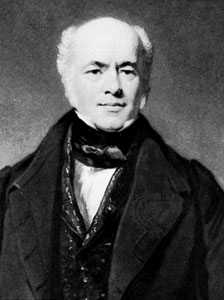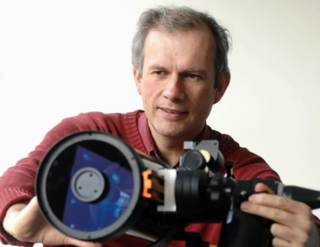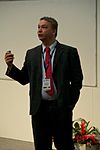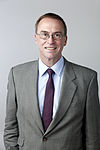
Francis Baily was an English astronomer. He is most famous for his observations of "Baily's beads" during a total eclipse of the Sun. Baily was also a major figure in the early history of the Royal Astronomical Society, as one of the founders and as the president four times.

The Royal Astronomical Society (RAS) is a learned society and charity that encourages and promotes the study of astronomy, solar-system science, geophysics and closely related branches of science. Its headquarters are in Burlington House, on Piccadilly in London. The society has over 4,000 members, known as fellows, most of whom are professional researchers or postgraduate students. Around a quarter of Fellows live outside the UK.

Dame Susan Jocelyn Bell Burnell is an astrophysicist from Northern Ireland who, as a postgraduate student, discovered the first radio pulsars in 1967. The discovery eventually earned the Nobel Prize in Physics in 1974; however, she was not one of the prize's recipients.

The Gold Medal of the Royal Astronomical Society is the highest award given by the Royal Astronomical Society (RAS). The RAS Council have "complete freedom as to the grounds on which it is awarded" and it can be awarded for any reason. Past awards have been given for "outstanding personal researches in the fields of astronomy and geophysics" as well as general contributions to astronomy and geophysics "that may be made through leadership in research programmes, through education and through scientific administration". It has been awarded both for research that has taken a lifetime, and for specific pieces of research.
The Eddington Medal is awarded by the Royal Astronomical Society for investigations of outstanding merit in theoretical astrophysics. It is named after Sir Arthur Eddington. First awarded in 1953, the frequency of the prize has varied over the years, at times being every one, two or three years. Since 2013 it has been awarded annually.
The Jackson-Gwilt Medal is an award that has been issued by the Royal Astronomical Society (RAS) since 1897. The original criteria were for the invention, improvement, or development of astronomical instrumentation or techniques; for achievement in observational astronomy; or for achievement in research into the history of astronomy. In 2017, the history of astronomy category was removed for subsequent awards and was transferred to a new award, the Agnes Mary Clerke Medal.
Dame Carole Jordan,, is a British physicist, astrophysicist, astronomer and academic. Currently, she is Professor Emeritus of Astrophysics at the University of Oxford and Emeritus Fellow at Somerville College, Oxford. From 1994 to 1996, she was President of the Royal Astronomical Society; she was the first woman to hold this appointment. She won the Gold Medal of the Royal Astronomical Society in 2005; she was only the third female recipient following Caroline Herschel in 1828 and Vera Rubin in 1996. She was head of the Rudolf Peierls Centre for Theoretical Physics at the University of Oxford from 2003 to 2004 and 2005 to 2008, and was one of the first female professors in Astronomy in Britain. She was made a Dame Commander of the Order of the British Empire in 2006 for services to physics and astronomy.
Philip Christopher England FRS is a British geophysicist and former Chair of Geology at the Department of Earth Sciences, University of Oxford, whose research centres upon the evolution, deformation and metamorphism of mountain ranges and the development of island arcs. He has widely used applied mathematics to model mountain building, proving that they behave as extremely viscous fluids.

The Chapman Medal is an award of the Royal Astronomical Society, given for "investigations of outstanding merit in the science of the Sun, space and planetary environments or solar-terrestrial physics". It is named after Sydney Chapman (1888–1970), a British geophysicist who worked on solar-terrestrial physics and aeronomy. The medal was first awarded in 1973, initially on a triennial basis. From 2004-2012 it was awarded biennially, and since 2012 has been annual.
Price Medal is a medal of the Royal Astronomical Society, for investigations of outstanding merit in solid-earth geophysics, oceanography, or planetary sciences. The medal is named after Albert Thomas Price. It was first awarded in 1994 and was initially given every three years. In 2005 this switched to every two years, and from 2014 it has been awarded every year.

Andrew Christopher Fabian is a British astronomer and astrophysicist. He was Director of the Institute of Astronomy, University of Cambridge from 2013 to 2018. He was a Royal Society Research Professor at the Institute of Astronomy, Cambridge from 1982 to 2013, and Vice-Master of Darwin College, Cambridge from 1997 to 2012. He served as president of the Royal Astronomical Society from May 2008 through to 2010.
Gerhart "Gerry" Neugebauer was an American astronomer known for his pioneering work in infrared astronomy.

The George Darwin Lectureship is an award granted by the Royal Astronomical Society to a 'distinguished and eloquent speaker' on the subject of Astronomy including astrochemistry, astrobiology and astroparticle physics. The award is named after the astronomer George Darwin and has been given annually since 1984. The speaker may be based in the UK or overseas.

Steven Andrew Balbus is an American-born astrophysicist who is the Savilian Professor of Astronomy Emeritus at the University of Oxford and a senior research fellow at New College, Oxford. In 2013, he shared the Shaw Prize for Astronomy with John F. Hawley.
Gilles Chabrier is a French astrophysicist who is best known for his work on brown dwarfs. He is currently a professor of astronomy at the University of Exeter.
Haley Gomez MBE, FRAS, FLSW is a Welsh Professor of Astrophysics at Cardiff University. She studies the formation and evolution of cosmic dust using the Herschel Space Observatory. She is Head of the School of Physics and Astronomy. She was awarded an Order of the British Empire in the 2018 Queen’s Birthday Honour’s.
John Henry Woodhouse is an English geophysicist, Emeritus Professor in the Department of Earth Sciences at the University of Oxford.
Stephen Eales is a professor of astrophysics at Cardiff University, where he is currently head of the Astronomy Group. In 2015, he was awarded the Herschel Medal from the Royal Astronomical Society for outstanding contributions to observational astrophysics. He also writes articles and books about astronomy.

Thomas Richard Marsh (1961–2022) was a British astronomer and astrophysicist. His research topics included the accretion and evolution of binary star systems. He was awarded the Herschel Medal in 2018 for his development of doppler tomography which he used to study compact binary stars.
















